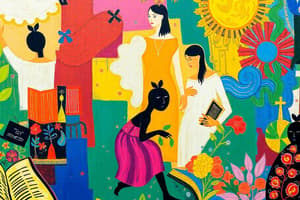Podcast
Questions and Answers
Who is considered the acknowledged master of traditional Tagalog poetry during the Spanish colonization period in the Philippines?
Who is considered the acknowledged master of traditional Tagalog poetry during the Spanish colonization period in the Philippines?
- Balagtas
- Jose Dela Cruz
- Komedya
- Francisco Baltazar (correct)
What is the name for riddles in Ilonggo?
What is the name for riddles in Ilonggo?
- Paktakon (correct)
- None of the above
- Tigmo
- Patotdon
What literary forms were prominent during the Nationalistic/Propaganda and Revolutionary period in the Philippines?
What literary forms were prominent during the Nationalistic/Propaganda and Revolutionary period in the Philippines?
- Memoirs and biographies
- Political essays, novels, and poetry (correct)
- Science fiction and fantasy
- Romance novels
What is another name for a play that is enacted in front of live audiences?
What is another name for a play that is enacted in front of live audiences?
What are tanaga?
What are tanaga?
Who wrote the poem "Mi Ultimo Adios" before his death?
Who wrote the poem "Mi Ultimo Adios" before his death?
What do fables use to convey their message?
What do fables use to convey their message?
What work did Andres Bonifacio write to arouse nationalism?
What work did Andres Bonifacio write to arouse nationalism?
Who was the foremost exponent of the komedya during his time?
Who was the foremost exponent of the komedya during his time?
Flashcards
Who is the acknowledged master of traditional Tagalog poetry during the Spanish colonization period?
Who is the acknowledged master of traditional Tagalog poetry during the Spanish colonization period?
Francisco Baltazar, also known as Balagtas, is considered the master of traditional Tagalog poetry during the Spanish colonization period in the Philippines.
What are riddles called in Ilonggo?
What are riddles called in Ilonggo?
Paktakon is the name for riddles in the Ilonggo language.
What literary forms dominated the Nationalistic/Propaganda and Revolutionary period in the Philippines?
What literary forms dominated the Nationalistic/Propaganda and Revolutionary period in the Philippines?
Political essays, novels, and poetry were prominent literary forms during the Nationalistic/Propaganda and Revolutionary period in the Philippines.
What is another name for a play performed live?
What is another name for a play performed live?
Signup and view all the flashcards
What are tanaga?
What are tanaga?
Signup and view all the flashcards
Which Filipino hero wrote "Mi Ultimo Adios"?
Which Filipino hero wrote "Mi Ultimo Adios"?
Signup and view all the flashcards
What do fables typically use to convey their message?
What do fables typically use to convey their message?
Signup and view all the flashcards
Which work did Andres Bonifacio write to arouse nationalism?
Which work did Andres Bonifacio write to arouse nationalism?
Signup and view all the flashcards
Who was a renowned komedya writer?
Who was a renowned komedya writer?
Signup and view all the flashcards
Study Notes
- Philippine literature includes riddles, proverbs, tanaga, folk songs, folk tales, myths, legends, fables, fantasy stories, and epics.
- Riddles are called Tigmo in Cebu, Paktakon in Ilonggo, and Patotdon in Bicol.
- Proverbs are wise sayings containing metaphors.
- Tanaga are one-stanza poems with four lines and seven syllables that rhyme.
- Folk songs include lullabies, work songs, drinking songs, and songs of lamentation for the dead.
- Folk tales and myths explain the origin of the world, animals, and natural features.
- Legends explain the origin of things.
- Fables use animal characters and allegory.
- Fantasy stories deal with underworld characters.
- Epics are narratives based on oral tradition revolving around supernatural events or heroic deeds.
Studying That Suits You
Use AI to generate personalized quizzes and flashcards to suit your learning preferences.




